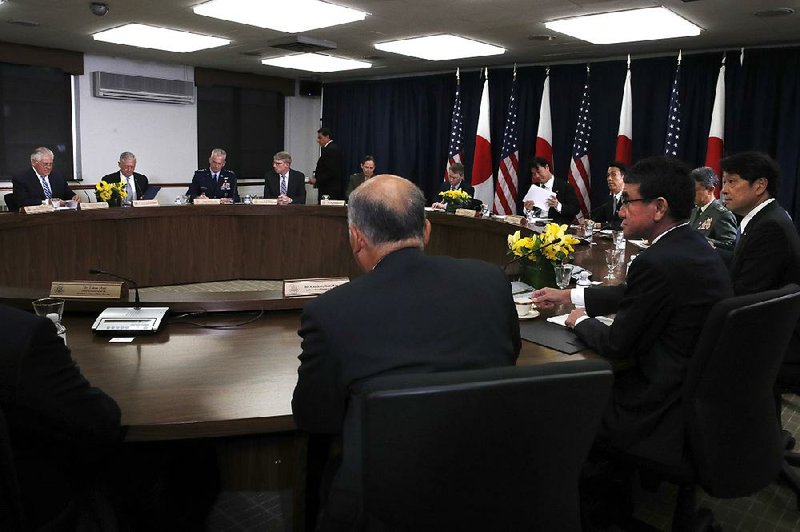WASHINGTON -- President Donald Trump's threats against North Korea are a means to "remind the regime" in Pyongyang what is at stake if it starts a war it cannot win, Secretary of State Rex Tillerson said Thursday.
"You've heard the words, you've seen the videos that they have produced," Tillerson said of North Korean threats to destroy the United States with nuclear weapons. "I think the president just felt it was necessary to remind the regime of what the consequences for them would be if they chose to carry out those threats."
Trump's warning last week that he would rain "fire and fury" on North Korea if it made a move against the United States complicated Tillerson's diplomacy with Asian partners gathered for a security conference that also included a North Korean envoy.
The conference ended with a strong statement condemning North Korea's nuclear and ballistic missile tests, but U.S. officials have had to repeatedly reassure allies that Trump does not intend to escalate an already precarious standoff.
North Korea appeared to carry out a successful test of an intercontinental ballistic missile last month, proving that it could threaten the U.S. mainland. The country is working to attach a nuclear warhead to such missiles, a capability that leader Kim Jong Un says he needs to prevent a U.S. attack on North Korea.
"Knowing that North Korea sits with a significant capability already within their grasp, I think it is only prudent that they fully understand the consequences, should they make a bad choice for themselves," Tillerson said.
Defense Secretary James Mattis warned Pyongyang that both the United States and Japan would respond with overwhelming force if it attacks first.
"Together, we will deter, and if necessary defeat, any threat," Mattis said in a news conference with Tillerson and their Japanese counterparts after a meeting at the State Department. "Any initiation of hostilities will be met with an effective and overwhelming response."
Asked what would happen if North Korea followed through on a threat to launch missiles toward the United States or its allies, Mattis replied, "We would take immediate, specific actions to take it down."
Tillerson declined to comment on reported remarks from Trump chief strategist Stephen Bannon that the escalating tensions surrounding North Korea are a "sideshow" to the more consequential economic competition between the United States and China.
"Until somebody solves the part of the equation that shows me that 10 million people in Seoul don't die in the first 30 minutes from conventional weapons, I don't know what you're talking about, there's no military solution here, they got us," Bannon was quoted as saying.
Tillerson added that he had read the remarks, which came during a lengthy interview Bannon gave earlier this week to the liberal American Prospect magazine.
"I think we have been quite clear as to what the policy and the posture toward North Korea is," Tillerson added.
Bannon, in the interview, called for a tougher U.S. stance on trade with China. He talked about purging rivals from the Defense and State departments to advance a more hawkish policy.
Bannon named the acting top U.S. diplomat for East Asia, Susan Thornton, as one official he wanted out.
At the start of Thursday's meeting, Tillerson shook Thornton's hand after greeting the Japanese visitors -- a gesture that State Department officials, speaking on condition of anonymity because they weren't authorized to comment publicly, said Tillerson went out of his way to do in an effort to demonstrate his confidence in the career diplomat.
Tillerson said the United States will continue to work diplomatically for negotiations that end with North Korea giving up its nuclear weapons.
"At some point, with a unified, international message like we've never had before, they will realize the level of isolation they find themselves in," he said of North Korea. "And that the future that they will face with that level of isolation is bleak and will only become bleaker."
Japan, which hosts about 50,000 U.S. forces members, has sought support for international efforts to pressure North Korea. The U.N. recently enacted its toughest sanctions yet after Pyongyang conducted its long-range missile tests last month.
Japan's foreign minister, Taro Kono, said at the news conference that the officials agreed to call on China to take "specific measures to make North Korea change its behavior," leading to a denuclearization of the Korean peninsula.
In Beijing on Thursday, the chairman of the U.S. Joint Chiefs of Staff, Marine Corps Gen. Joseph Dunford, told reporters that Trump directly has "told us to develop credible viable military options, and that's exactly what we're doing."
In response to questions about Bannon's dismissal of a military response, Dunford said it's "absolutely horrific if there would be a military solution to this problem, there's no question about it."
But, he added, "what's unimaginable is allowing [Kim] to develop ballistic missiles with a nuclear warhead that can threaten the United States and continue to threaten the region."
Days after North Korea considered launching a pre-emptive missile strike on Guam, the U.S. Navy today awarded a contract for utility construction and site improvements for a future Marine Corps base on the U.S. territory.
"This effort is a big step in strengthening Guam, as part of the Marianas strategic hub, ensuring the Marine Corps' ability to sustain a forward presence within the Indo-Asia-Pacific region," Lt. Gen. David Berger, commander of U.S. Marine Corps Forces Pacific, said in a statement.
The Navy said the $164.9 million Japanese-funded contract was awarded in support of an international agreement between the U.S. and Japan. The relocation of Marines from Japan to the island has been in the works for more than a decade.
Information for this article was contributed by Anne Gearan and Carol Morello of The Washington Post and by Matthew Pennington, Matthew Lee, Christopher Bodeen, Hyung-Jin Kim and Kim Tong-Hyung, Gillian Wong, Foster Klug, Robert Burns and Brian Skoloff of The Associated Press.
A Section on 08/18/2017

